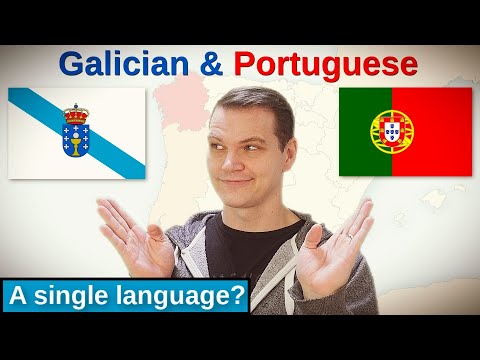Langfocus
In this video I examine Galician and Portuguese to see if they are similar enough to be considered two varieties of the same language. 🚩 Learners of Portuguese, check out PortuguesePod101: https://langfocus.com/portuguesepod.
🚩 For 33 other languages: https://langfocus.com/pod101
Special thanks to Carlos Costa for his Portuguese samples, and Marilú for her Galician samples.
📊 Donate with cryptocurrency:
📊 Bitcoin (BTC): 1MLRqj7hbcDZp7rNKzALX7DcdQnBqiZFR3
📊 Bitcoin Cash (BCH): bitcoincash:qr0s7fugd65fcch32cm66a09jzcxf8mfwgmdqhjvsd
📊 Ether (ETH): 0x8683069D7B071AB2D99d9a949d7224454136fDE1
🟧 These amazing people support Langfocus on Patreon 🔹🔷 https://patreon.com/langfocus 🔷🔹:
Ali Mametraimov
AmateurTextualCriticism
Anton Opanasenko
Auguste Fields
Bennett Seacrist
Bill Walderman
Brandon Gonzalez
Brian King
Bruce C
CFitz17
Clark Roth
Colin Milner
Irina Bruce
J Choi
Jacob Madsen
John Moffat
Karl-Erik Wångstedt
Kenny
Kirk Kirkpatrick
Marcelo Loureiro
Matthew Etter
Michael Arbagi
Michael Cuomo
Michael Regal
Mody
Moe
Nobbi Lampe-Strang
Patricia Roxanne Warner
Paul Falstad
Rosalind Resnick
Ruben Sanchez Jr
ShadowCrossZero
Simon Jaglom
Sonja Lang
Victoria Goh
Vincent David
W T
Walter Moore
Wolfgang Egon Schroder
Yuko Sunda
19jks94
Abdullah Al-Kazaz
acidvenom
Adam Powell
Adam Vanderpluym
Alan Corley
Alana Kalinowski
Alen
Alex Hanselka
Alexandre Smirnov
Ali Muhammed Alshehri
Alvin Quiñones
Andrew Woods
Anthony Kinread
Anthony Peter Swallow
Aous Mansouri
Armando Fox
Ashley Dierolf
Avital Levant
Bartosz Czarnotta
Ben
Brent Warner
Brian Begnoche
Brian Morton
Bruce Stark
Cary Todd
Chelsea Boudreau
chris brown
Christian Langreiter
Christopher Lowell
contumaciousCulimancer
Cyrus Shahrivar
Daniel Leon
Daniel Young
Darek
David Eggleston
David LeCount
Dean Cary
Debbie Willow
deezebee
Diana Fulger
Diane Young
DickyBoa
Dieter Raber
Dina Trageser
divad
Divadrax
Don Ross
Donald Tilley
Dulta Tracey
Ed B
Ed Heard
Edward Wilson
Elizabeth Evans
Eren Parla
Eric Loewenthal
Fabio Martini
fatimahl
Fawad Quraishi
G Bot
Grace Wagner
Gregory Garecki
Guillaume Brodar
Harry Kek
Henri Saussure
Herr K
Howard Clark
Hugh AULT
Ina Mwanda
Jacek Sz
Jack Jackson
James and Amanda Soderling
James Lillis
JAMES ORR
Jay Bernard
Jenna Matthews
Jens Aksel Takle
Jim McLaughlin
Jim Wink
JK Nair
JL Bumgarner
John Gavin
John Hyaduck
Josh Rotenberg
Josiah Scott
Julie Sriken
K M
Kimball Pierce
kingvaeonic
Kirk Vistain
Klaw117
Konrad
Kristian Erickson
Krzysztof Dobrzanski
KW
Kyle James
Lance Bedasie
Laura Morland
Lee Dedmon
Leo Coyne
Leo Barudi
Lincoln Hutton
Lissette Talledo
Lorraine Inez Lil
Louie dela Fuente
Luis1311 17
Luke Jensen
M.Aqeel Afzal
Mahmoud Hashemi
Mai Rose
maiku
Margaret Langendorf
Maria Comninou
Mark
Mark Bonneaux
Mark Judge
Mark Kemp
Markzipan
Martin Blackwell
Merrick Bobb
Merrick Bobb
Michael Sisson
Mike Frysinger
Mohammed A. Abahussain
Mário Pegado
Naama and Geoff Shang
Nadia B.
Nicholas Gentry
Nicole Tovar
Niro
noxialisrex
Oleksandr Ivanov
Oto Kohulák
ou_lyss
Papp Roland
Patrick smith
Patriot Nurse
Paul Flynn
Paul Shutler
Pauline Pavon
Paulla Fetzek
Peter Andersson
Peter Devlin
Peter Nikitin
Peter Scollar
piero
Raymond Thomas
Renato Paroni de Castro
ReysDad
Richard Kelly
Robert Brockway
Robert Sheehan
Robert Williams
Robyn Morales
Roger Smith
Roland Seuhs
Ron McKinnon
Ronald Brady
Saffo Papantonopoulou
Sergio Pascalin
Sheila Perryman
Sierra Rooney
Sigbjørn Nerland
Simon Blanchet
Stefan Reichenberger
Steven Severance
Suzanne Jacobs
system_survivor
Tara Pride
Theophagous
Thomas Chapel
Thomas Gijsbers
thug rife
tommy dahill
Ulf Hermjakob
Uncle Beef
Vinicius Marchezini
Vitor
Warren McKenzie
William MacKenzie
William O Beeman
Yagub Alserkal
yasmine jaafar
Yeshar Hadi
Yuriy Vrublevskiy
Yuval Filmus
Zachary Root
zhangyimo
Éric Martin
Навальный
洋平 木嶋
Images used under Creative Commons Share-Alike license:
https://commons.wikimedia.org/wiki/File:Location% C3% B3n_de_Galicia.svg. Authors: Mutxamel, Rastrojo.
https://commons.wikimedia.org/wiki/File:Corona_de_Castilla_1400_es.svg. Authors: Tea and kryptonite, HansenBCN.
https://commons.wikimedia.org/wiki/File:Europe-south-west-kingdoms.png. Author: Alexandre Vigo.
https://en.wikipedia.org/wiki/File:506-Castile_1210.png. Author: Alexandre Vigo.
Screenshots that include the above images may be used under the same Creative Commons Share-Alike license.
00:00 Our sponsor
00:14 What is Galician?
0:047 The shared history of Galician and Portuguese
01:49 Is Galician a dialect of Portuguese?
02:58 Sample monologues in Galician and Portuguese
03:36 Differences in pronunciation between Galician and Portuguese
09:15 Different word forms in Galician & Portuguese
10:06 Differences in Galician and Portuguese verbs
11:02 Galician and Portuguese pronouns
11:36 Comparing equivalent sentences in Galician and Portuguese
15:13 Final comments: Are Galician and Portuguese a single language?
16:13 The Question of the Day .
